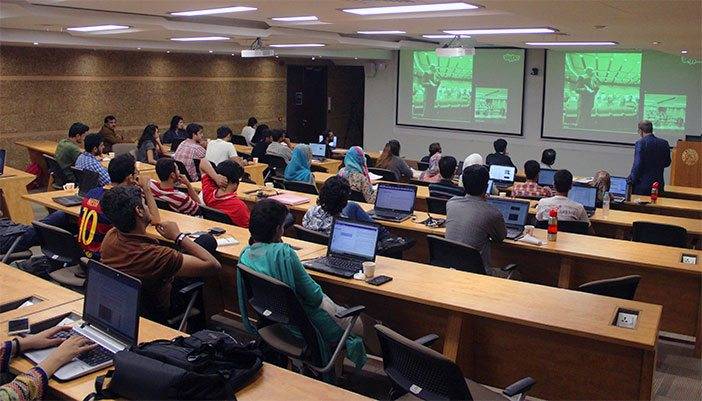
Last summer, I stopped at a roadside eatery in Barkat Market, Lahore. A young man and a young lady, both in their early twenties, were embroiled in an argument about the importance of English. As I placed my order, I overheard their spirited conversation—the young lady was endeavoring to persuade the young man about the significance of learning English, while he dissented.
I decided to intervene.
I invited them to join my table, an invitation they accepted. Introducing myself as a university instructor, I explained that I had overheard their discussion on the importance of English and wished to elucidate its meaning and significance. Contrary to the prevailing argument in this country that English doesn't reflect one's intellectual ability and knowledge, I endeavored to explain that the quality of language, not just English, reflects the socio-cultural background and association of an individual. The accent one speaks and the intonation convey the background of the person. I recalled the British actor Rowan Atkinson, known as Mr. Bean, mentioning in one of his interviews that when he was selected for a TV show to play a character from the south of England, he had to work on his accent. Coming from the north—Consett, in the Durham district of Scotland—his intonation was quite different from what the character demanded. The south of England is home to the upper middle class, with a much more refined accent. As for the notion that English doesn’t determine one’s intellectual ability and knowledge, it is also arguable because a significant number of publications on a range of subjects are mostly in English, which has certainly acquired the status of an international language.
This young man, however, remained adamant in his disagreement.
He argued that his family, which, according to him, hailed from a remote district of Baluchistan province, was very well off, and none of them had proper schooling, let alone the ability to read or speak English of any quality at all. Their business success did not owe anything to knowing or unknowing English. This argument reminded me of many people from the business community in Lahore when I was growing up, and I recalled how deprived they felt over the years, despite their business successes, for not having better education or knowing proper English. Their feelings are hard to hide in social gatherings, where, despite their business successes, they find themselves standing outside of any learned conversations.
Urdu developed in the north of India during the rule of the Mughal emperors, who patronized Urdu poets and musicians alike. Over the centuries, a significant investment was made from the royal exchequer in this regard, which helped the Urdu language flourish and refine. The result was the emergence of poets like Mir Taqi Mir and Asadullah Khan Ghalib during the 18th century.
This is not merely the case with the English language alone.
Urdu developed in the north of India during the rule of the Mughal emperors, who patronized Urdu poets and musicians alike. Over the centuries, a significant investment was made from the royal exchequer in this regard, which helped the Urdu language flourish and refine. The result was the emergence of poets like Mir Taqi Mir and Asadullah Khan Ghalib during the 18th century. The north Indian accent came to be regarded as the standard Urdu accent, and those existing closer to the Royal court were recognizable by the quality of Urdu they spoke. Therefore, Urdu was not just a language. It represented one’s socio-cultural associations. It determined one’s social status.
The same is true for any language, and so it is with English. The quality of English one speaks determines one’s cultural background and social status.
I endeavored to convey this point to that young man. The quality of language you speak, your accent, serves as a passport to many circles. Remember the British comedy show, Mind Your Language, from the 1980s? In that show, people from different cultural backgrounds come together in the English language class of Mr. Brown, an Oxford graduate Englishman. The ‘humor’ is generated through the accents and the mispronounced words they speak in the class. During the 1980s, when Britain experienced a huge inflow of emigrants, their accents became a target of social rebuke. On British television, such comedy shows came to be termed as ‘trial by accent’ at the cost of the foreigners on the British soil who didn’t speak the words exactly as the local people did.
Given that one learns the language from their surroundings, one adopts the kind of language spoken around them.
Have we in Pakistan not experienced the same thing? People who speak Urdu or even Punjabi words differently sometimes face grins or even correction?
Given that one learns the language from their surroundings, one adopts the kind of language spoken around them. The world—societies—comprises concentric circles: family, neighborhoods, schools, universities. These institutions are not solely meant for acquiring knowledge; they represent one’s sociocultural associations. Within these circles, one's social and political identity is forged. Therefore, being an enrolled student in a top university makes a difference—you are then regarded as a member of their group – that circle, that culture. This will have an impact on how you speak, how you dress, and what kind of people you can access. In all of this, the quality of the language you speak will play a pivotal role.
In other words, the quality of language one speaks tells of one’s cultural backgrounds and social associations.
It may be politically problematic to say, but the truth of the matter is that this world is structured around these circles. And every circle is recognizable by its language. In Pakistan (and in India), with a colonial history, English does have an elitist status—the status that Urdu once enjoyed during the Mughal rule in the Indian subcontinent.

